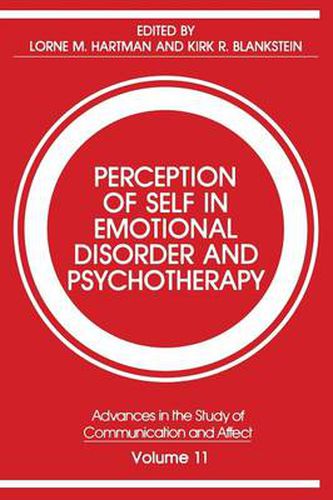Readings Newsletter
Become a Readings Member to make your shopping experience even easier.
Sign in or sign up for free!
You’re not far away from qualifying for FREE standard shipping within Australia
You’ve qualified for FREE standard shipping within Australia
The cart is loading…






This title is printed to order. This book may have been self-published. If so, we cannot guarantee the quality of the content. In the main most books will have gone through the editing process however some may not. We therefore suggest that you be aware of this before ordering this book. If in doubt check either the author or publisher’s details as we are unable to accept any returns unless they are faulty. Please contact us if you have any questions.
One’s view of self has pervasive and significant effects socially, psychologi cally, and even biologically. Regardless of theoretical differences, most psycho therapists agree that perception of self in one way or another profoundly impacts emotional satisfaction, behavioral adaptation, and rational thinking. Self-accep tance has played a major role in almost every major theory of personality. Despite its recognized importance over the years, only recently has the percep tion of self received vigorous research attention as a central variable in the development and maintenance of psychological dysfunction and as a mediating mechanism in effecting psychological change. Several lines of evidence point to the importance of self-perception in emotional disorder and psychotherapy. Feelings of inadequacy and unworthiness are frequently cited complaints among persons seeking psychological help. Peo ple with low self-esteem see themselves as helpless and inferior. They feel incapable of improving their situation. They fail to evidence the requisite inner resources or coping abilities for tolerating the stress of their life situation. The ability to be involved in healthy intimate relationships, to engage in successful career performance, to experience satisfactory sexual functioning, or to maintain effective mood management are all subject to disruption as a result of inconsis tent and impaired self-appraisal.
$9.00 standard shipping within Australia
FREE standard shipping within Australia for orders over $100.00
Express & International shipping calculated at checkout
This title is printed to order. This book may have been self-published. If so, we cannot guarantee the quality of the content. In the main most books will have gone through the editing process however some may not. We therefore suggest that you be aware of this before ordering this book. If in doubt check either the author or publisher’s details as we are unable to accept any returns unless they are faulty. Please contact us if you have any questions.
One’s view of self has pervasive and significant effects socially, psychologi cally, and even biologically. Regardless of theoretical differences, most psycho therapists agree that perception of self in one way or another profoundly impacts emotional satisfaction, behavioral adaptation, and rational thinking. Self-accep tance has played a major role in almost every major theory of personality. Despite its recognized importance over the years, only recently has the percep tion of self received vigorous research attention as a central variable in the development and maintenance of psychological dysfunction and as a mediating mechanism in effecting psychological change. Several lines of evidence point to the importance of self-perception in emotional disorder and psychotherapy. Feelings of inadequacy and unworthiness are frequently cited complaints among persons seeking psychological help. Peo ple with low self-esteem see themselves as helpless and inferior. They feel incapable of improving their situation. They fail to evidence the requisite inner resources or coping abilities for tolerating the stress of their life situation. The ability to be involved in healthy intimate relationships, to engage in successful career performance, to experience satisfactory sexual functioning, or to maintain effective mood management are all subject to disruption as a result of inconsis tent and impaired self-appraisal.